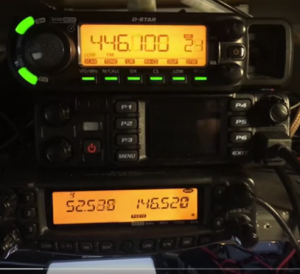The 2020 Ohio ARES VHF Simplex contest was a lot of fun for all of us that participated.
You can download a recording of most of the traffic heard on in the contest here on our OneDrive share. Once you click the link to get to the folder, you can right click on each file to download it. This year each hour of the contest is saved in a separate file, named with the time range on the end of the file name (ie: 1000-1059)

A few notes with the files
- The recordings were made with two radios.
- A Yaesu FT-8900 scanning 6m simplex 52.525, 52.510, and 52.540, fed into the right audio channel
- An Icom ID-880H scanning 2m and 70cm simplex frequencies, fed into the left audio channel
- Since the radios were scanning, you won’t always hear complete QSOs
- Silence was removed from the file as the recordings were made, so a recording of a 1 hour time may be less than an hour.
- The files from later in the contest have some noise bursts from the 6m radio. Next year I’ll tighten up the squelch a bit. The earlier recordings seem fine on the 6m side.
Recordings were made from Rittman, OH EN90cx from a Diamond V2000a antenna up 25′ with the base at 1148′ ASL.
If you’re interested in doing something like this yourself, it was done by wiring the speaker output of the two radios into the line-in on the computer’s soundcard through a 10k resistor with one radio into the left audio channel and the other into the right channel.
On a Linux computer this command records the audio and limits slices to 15 seconds and trims off any silence longer than 1 second:
sox -c 2 -r 8000 -t pulseaudio alsa_input.pci-0000_12_00.3.analog-stereo ./rove-recordings/1.ogg silence 1 0.1 1% 1 2.0 1% trim 0 15 : newfile : restartThe hardest part of the above command is finding the exact name of the pulseaudio source on your computer in the above command. This worked for me along with a little experimenting:
pactl list short sourcesOnce the contest is over, I put the recording files into folders by hour, then combined each hour into a continuous file with this Linux command:
cat *.ogg > ../combined.oggThen finally each of the hourly combined files were converted to mp3 format with this command:
ffmpeg -i inputfile.ogg -acodec libmp3lame outputfile.mp3


